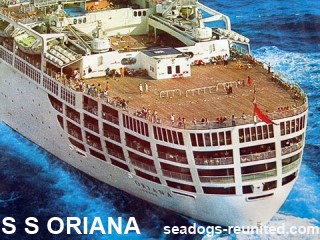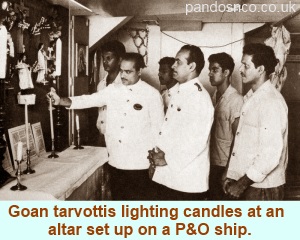A popular, farewell Goan mando
 In the latter half of the1800s, British shipping companies began operating larger, and more modern steamships, opening up a huge market for maritime labour.
In the latter half of the1800s, British shipping companies began operating larger, and more modern steamships, opening up a huge market for maritime labour.
The sudden availability of jobs on a large scale was a bonanza for Goan men frustrated by the lack of job opportunities in Portuguese Goa. Here was their chance to earn some decent money, to afford a better lifestyle for their family and a better future for their children. The price they had to pay? Months at sea enduring the rigours of life as seamen, and the pain of separation from their loved ones with hardly any contact with them till the end of each voyage.
Hundreds of Goan families were torn apart when husbands chose to sail off to faraway lands as tarvottis. And when that happened, both parents had to bear the brunt and angst of separation.
Well aware of the pain of parting that was jolting families across Goa, our mando composers effectively captured this in the most poignant way through farewell Goan mandos. One such timeless composition is Adeus korcho vellu paulo – a popular mando echoing the anguish of tarvotti families.
Created by one of our greatest composers, Torquato de Figueiredo, some time before 1905 when only in his late twenties, this moving farewell mando has several fascinating stories associated with its conception. Nonetheless, many agree its inspiration could well have been the frequent, painful partings between tarvottis and their families Torquato had witnessed.
The socio-cultural phenomenon of Goan men seeking seafaring jobs to ensure better prospects for their family was also a subject for creative expression for tiatrists like Minguel Rod, C. Alvares, and M. Boyer, tiatr writers, and even film makers. Remember the Konkani classic ‘Nirmon‘ where the impoverished musician Marku, played with finesse by the great tiatrist C. Alvares, was compelled to become a tarvotti to make ends meet?
The heyday of Goan tarvottis
 Thanks to the introduction of the more advanced British mercantile steamships, seafaring became a major employment generator for Goans from the last decades of the 19th century onwards .
Thanks to the introduction of the more advanced British mercantile steamships, seafaring became a major employment generator for Goans from the last decades of the 19th century onwards .
Of the different shipping companies, the British India Steam Navigation Company and the Peninsular and Oriental Steam Navigation Company, popularly called BI and P&O respectively, offered the largest number of employment opportunities. While a number of Goan men joined these companies as clerks or became customs officials, the vast majority signed up as dining saloon crew, cabin stewards, butlers, and cooks. And with the demand exceeding supply, jobs were aplenty.
Both the companies operated cargo as well as passenger ships, but jobs on the latter were more sought after because of the add-on bonus of generous tips from passengers. By the early 1900s, around two-thirds of the workforce on ships sailing from Bombay comprised Goans, almost all of them Catholics.
Appreciation from British officers
Their familiarity with western culture and lack of inhibitions in preparing non-vegetarian food gave Goan Catholics an advantage over other Asian seamen. Also, Goan dining saloon, pantry, and kitchen staff had gained a reputation for being dilligent, sincere, and meticulous in their work, and soon British ship captains began to hold them in high regard and express their preference for them.
In 1957, Captain Baillie, who commanded several P&O liners, wrote: “I have never failed to appreciate the cleanliness, discipline and comfort of our ships in which the deck hands are Lascars and the stewards mostly Goans.”
Appreciating the work of Goans and other Asian crew of P&O ships, M. Watkins-Thomas wrote in 1955 that these men devoted “the best part of a lifetime to serve in the Company’s ships”.
One of the P&O advertisements published in the British national press in the 1950s describes the excellent service by Goan dining saloon staff thus: “…No sooner are you seated than you find a napkin in your lap and a menu in your hand. You order. The friendly genie smiles – then almost before you realise that he has left your side, the melon appears complete with sugar and ginger… …Meanwhile your butter is replenished, your glass filled, your slightest wish attended to. Never in your life have you had such service… …he is Caetano X. Fernandes, Table Steward aboard the P & O’s SS Chusan… …One of the 72 Goan waiters on board the ship… “
Those who grew up in the 1950s, 60s, or 70s will remember the thrill of using the foreign perfumed bath soaps (LUX, Pears), scents (Charlie – Revlon’s top-selling perfue in the 70s), fragrant talcum powders (Yardley), and textiles (Japanese brocades), and yes, the famous Tiger balm brought back by tarvotti relatives from their voyages abroad.
The Kutani tea set my paternal uncle, a store keeper for the BI shipping company like my grandfather before him, brought from Japan is a prized family possession. My maternal grandfather worked as a clerk at the BI company’s Bombay office, but he would often have to go on board ships headed for Karachi, Basra and other port cities in the Gulf. My mother often told us how she and her siblings would eagerly look forward to relishing the plump, melt-in-the-mouth, black dates he would bring back from Basra.
 Yes, those were the days when we would invariably link tarvottis to foreign goodies, sparing no thought to the hours of hard work – 12 hours or more each day, with scarcely any days off – and the months of lonesomeness. The only means of communication for Goan tarvottis and their families back then was through handwritten letters received weeks or months after they were sent.
Yes, those were the days when we would invariably link tarvottis to foreign goodies, sparing no thought to the hours of hard work – 12 hours or more each day, with scarcely any days off – and the months of lonesomeness. The only means of communication for Goan tarvottis and their families back then was through handwritten letters received weeks or months after they were sent.
Urgent news, like a death in the family or a seaman being seriously sick would be communicated through the shipping company’s office, and that too would take some days. My paternal grandfather learnt of the sudden death of one of his sons, a cute toddler then, due to internal brain haemorrhage following a freak accident more than a month after the tragic incident. Imagine the overpowering feelings of grief, frustration, and helplessness he and my grandmother had to bear individually halfway across the globe from each other.
Understandably, the moment of parting for tarvottis and their wives was fraught with anxiety. Wives would have to play both mother and father to their kids and could only pray that their husbands would return from their voyages safe and sound. On their part, trapped between big dreams for their families and the harsh realities of their profession, the husbands continued making voyages year after year.
Meagre admiration from their own
Sadly, our hard-working tarvottis receive scant appreciation from fellow Goans for their contribution towards uplifting Goa’s economy and the standard of living across the state. Many fail to remember that their sweat and sacrifices set the stage for the emergence of Goa, the smallest state in India, as the one with the highest per capita income!
Three cheers for our tarvottis!
In conclusion, enjoy Torquato de Figueiredo’s popular farewell mando Adeus korcho vellu paolo rendered by my brother Gladwyn and me, and also the images of the iconic ships on which our Goan tarvottis once sailed. Don’t forget to share the link with others.

Veena and Gladwyn,
Excellent! Takes me back to the 60s and fond memories of me and Gladwyn singing bau ami khudhe! Would like to get in touch with Gladwyn!
Thanks Louis. Glad that the post and mando revived beautiful memories for you, and glad that you’ll be able to make contact with Gladwyn again.
GAVANA – Goa’s cultural ambassadors 1988 – 2002, took this beautiful mando de despedida to the world. Thank you for the rendition and your take on it all…. margarida tavora e costa…nostalgia, raia, south goa.
Thanks for the compliment Margarida. But I must take this opportunity to appreciate your group’s celebration of Goa’s culture through music, song, and dance. Am sure your rendition of this beautiful farewell mando, mando de despedida – as you put it, must have been nothing short of outstanding. Have watched a couple of your dekhni videos shared by a friend on Facebook and thoroughly enjoyed them. Took me back to the days when I was a member of the folk dancing troupe trained by Mrs. Olga Colaco… Was it really so long ago?